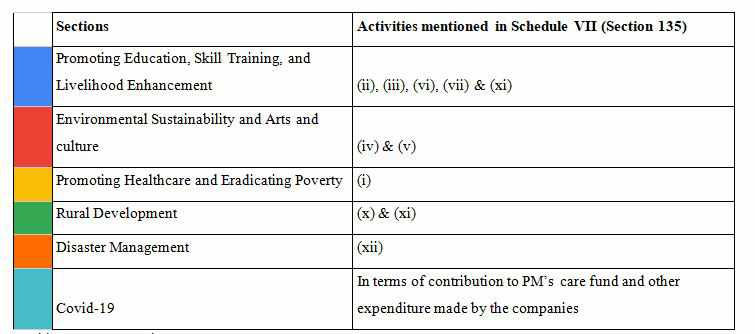
By Monica Sareen (PhD Scholar, MNIT Jaipur) and Ritika Mahajan
Introduction
Section 135 of the Companies Act, 2013 makes it mandatory for companies with a turnover of INR 1000 crores or net worth of INR 500 crores or net profit of INR 5 crores to set up a committee. This committee formulates, executes and monitors the CSR policy of the company to spend a minimum two percent of the last three years average net profits on CSR activities. Although there is hardly any penalty for breaching this law but it is a significant development in business regulation. India is the only country globally with such a mandate; the issue of debate is that responsibility must not be mandatory, and charity, the kind of CSR promoted by this regulation, is more meaningful if voluntary. Post-2013, researchers documented the law’s positive impact, leading to an increase in CSR activities in the country. Still, the critique continues because CSR does not focus on how the business profits. However, this article keeps aside the debate for a while and explores if this regulation and CSR by leading companies in India played a role during the Covid-19 pandemic.
Purpose
In the last two years, the pandemic threw the entire globe into disarray and ushered in a period unlike any other. Mandatory lockdowns of varying degrees impacted the economy, healthcare, supply chains, turnover, and other aspects. Businesses, especially service industries like information technology and e-commerce, continued to function and even contribute to the fight against the pandemic despite the interruption and precautionary limits. Against this backdrop, we analyse the CSR expenditure of the top 10 NSE-listed companies in response to the pandemic. We explore funds spent, significant projects, and trends, or in other words, who was the kindest of them all?
Method
On March 23, 2020, the Union Government announced that all expenditure on COVID-19 relief would be authorised as CSR activity. Funds may also be used for initiatives related to preventive health care, sanitation and disaster management. The companies in India have contributed towards the pandemic through non-profits, the PM CARES fund and self-sustained, voluntary initiatives, including manufacturing PPE kits, installing oxygen plants, and driving relief efforts. CSR has, thus, been a prominent source of funding during the pandemic.
Accordingly, we examined the broad research question in this study - “How did the market-leading firms contribute to the fight against the pandemic through CSR?” We analysed the CSR expenditure of top 10 NSE-listed companies based on their market capitalisation (shown in Table 1) by collating data from their annual, CSR and business responsibility reports for three years, i.e., 2018-19, 2019-20 and 2020-21 to make inter and intra-company comparisons for the pre and post Covid-19 period. Different CSR projects were clubbed into six categories (mapped with Schedule VII as shown in Table 2). For eg, promoting sports among youth is covered under Section 1, i.e. Promoting Education, Skill Training, and Livelihood Enhancement. Key observations from the analysis are discussed ahead.


Key Highlights
Total Funds: These ten companies spent approximately INR 28.5 billion on CSR activities in 2018-19 and almost INR 35 billion rupees in 2020-21. Despite the challenges of a pandemic, there was an increase of 21 percent in the expenditure. Almost INR 15 billion was spent only on COVID-19 activities over two years.
Sector-wise spending: From promoting healthcare and eradicating poverty, which saw a fall of 54% in 2020-21, companies shifted expenditure to Covid-19 relief. The highest expenditure, as usual, was allocated to promoting education, skill training, and livelihood enhancement, although it decreased from 39% to 26.9% pre to post-pandemic. Companies’ contribution to rural development remained consistent, with a minor change of 1.3% in 2019-20. Overall expenditure on environment sustainability, arts, and culture continued to stay low. A comparison for three years is shown in Figure 1.
Top contributors: The top 3 contributors during the pandemic were Reliance Industries, TCS and Infosys. As a percentage of profits, their CSR budgets were almost 2 percent. Reliance was the top contributor and spent close to INR 6.8 billion. Airtel contributed despite incurring losses consecutively for both years. During the emergence of the pandemic, 7 out of 10 companies saw a fall in their stock prices, whereas three companies, i.e., HUL, Kotak Bank, and Airtel, saw a rise. In the post-pandemic period 2020-21, none saw a fall in their stock prices out of the ten companies. TCS has seen a fall in its stock price since 2018. However, it remained a top contributor to pandemic relief.
Covid-19 Activities: Over the COVID-19 period, i.e. 2019-21, all ten companies, despite some incurring losses and decrease in profits, made significant contributions to the pandemic. The activities included (a) donations to the PM Cares fund and significant NGOs, distribution of meals and ration to migrant workers, manufacturing/distribution of masks, soaps, hand Sanitisers, etc., (b) supporting front line workers and affected people by providing PPE kits, oxygen cylinder supply to hospitals, masks, sanitisers, isolation care centres in partnership with hotels etc., and (c) organising free vaccine drives, care centres, setting up a relief fund, virtual learning programs and so on.
Prominent Projects: Reliance launched Mission Anna Seva which distributed 5.5+ crore meals to over 27+ lakh beneficiaries and provided oxygen equivalent to the daily requirement of 1,00,000+ patients per day. ITC trained more than 3.8 lakh farmers and 18,000 government and front-line personnel. TCS provided 100,000+ PPE to police and front-line workers and built capacity for 200 doctors across 22 hospitals. HUL donated over INR 2 crores soaps and sanitisers, bottles of Domex, and packs of Horlicks and other products to the front-line medical professionals, police officials, sanitation workers, migrant population, and vulnerable people of the country, in partnership with the Government and various NGOs. Infosys contributed to medical equipment and infrastructure such as ventilators, patient monitoring systems, viral transport media, N95 masks, non-contact infrared thermometers, medical gas pipelines, and gas manifold systems, PPE kits etc. pan-India to hospitals. Bharti Airtel ensured that students continued to learn by creating 1,000+ Class-wise WhatsApp groups and 3,831 Videos created by teachers for use by peers.

Emerging Issues
In March 2020, the Union and state governments in India declared lockdowns that impacted supply chains, demand, and other aspects. Despite such challenges, stakeholders expected businesses to come forward and help. It was a time when businesses were expected to demonstrate empathy and generosity through CSR with the amount of resources at their disposal. Based on our analysis, the top companies supported the COVID-19 relief measures. The support included direct relief efforts and the creation of funds and donations to non-profit organisations. Overall findings reveal that these companies responded quickly with large expenditures and extensive efforts. What does this indicate for the future of CSR regulation in India? There are a few emerging issues that can be explored in this regard.
One, the top three companies in India spent close to 2 percent of their profits on CSR activities. Would the scenario have been any different in the absence of section 135?
Two, ideally, if CSR is not a proper solution as it does not control the way business makes profits, who would have funded the pandemic relief activities that benefitted millions?
Three, as the corporate sector contributed during the pandemic, is there still a need for a stringent penalty for not contributing 2 percent profits to CSR?
Four, would a progressive system for deciding CSR expenditure as a percentage of profits be better as all the companies are required to spend two percent irrespective of their profits, turnover or market capitalisation?
Five, which is better - charity or a circular economy based business model?
Six, how do we measure CSR expenditure’s impact - whether it reached the right beneficiaries or not?
Seven, should we consider a pandemic as an extraordinary situation and not make any decisions based on CSR efforts during the pandemic? But then, are we prepared for another crisis, say like climate change?
Eight, can a collective fund under a national CSR committee’s responsibility yield better results than the individual corporates designing and executing projects?
Nine, do we need more regulation to increase transparency in CSR reporting? Or should we not push it any further?
Ten, as we move closer to the 2030 deadline for the SDGs and the 2070 net-zero target, how do we align all the regulations like business responsibility reporting and CSR for better impact?
All these issues can be explored further for regulatory changes as the significance of CSR has been immense during the pandemic. We looked at only the top 10 companies as per their market capitalisation, a sample that can be expanded to include more companies. Furthermore, future research may investigate how CSR affected a company’s reputation during the pandemic. While we only looked at the financial reports, future research may analyse the ground reality. Finally, stakeholders’ impressions and internal insights from organisations can help understand the challenges for business organisations in implementing and evaluating CSR activities.
Now published at: https://terragreen.teriin.org/index.php?option=com_terragreen&task=detail§ion_id=4618&category_id=20&issueid=179



-3_page-0001.jpg)


.jpg)






.jpg)







Write a comment ...